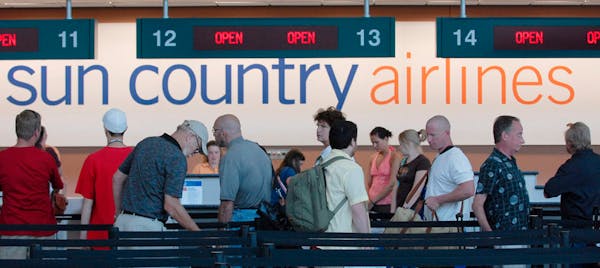With no relief in sight from high oil prices, Northwest Airlines Tuesday announced its second round of capacity cuts this year as it said it will retire jets and promised an undisclosed number of staff reductions.
In a statement, the company said it would first look to "voluntary separation programs" such as early retirement.
The Eagan-based airline also said it will raise fares, fees and fuel surcharges, although it released no details. Northwest followed its competitors recently in adding a $25 charge on second and third checked bags -- and some of the same competitors have since announced new $2 fees for sodas and juice in coach and a $15 fee for the first checked bag.
In the statement, CEO Doug Steenland said that the carrier is "taking prudent action to reduce our capacity and right-size the airline."
The scope of the additional reductions remains unclear. Northwest said it would reduce domestic and international capacity in the fourth quarter by 8.5 to 9.5 percent. Previously, it had said fourth-quarter domestic capacity would be cut 12.6 percent.
Tuesday's announcement didn't break out domestic versus international capacity. Northwest had been expanding its international routes. As recently as January, it had expected international business to increase by 8 to 9 percent in 2008.
In the first quarter, Northwest expanded its international capacity over the Atlantic by more than 16 percent. But then, oil was less than $100 a barrel.
Northwest was one of the first to announce capacity cutbacks back in April, and other airlines in recent weeks also have pared back their schedules. United plans 14 percent less capacity and American between 11 and 12 percent fewer domestic miles.
As part of the capacity reduction, Northwest will cut its fleet by 47 aircraft, including 14 Boeing 757s and Airbus A319s and A320s, and dropping from 94 DC-9s at the beginning of 2008 to 61 by year-end.
Details on which hubs and employees would be affected were not available Tuesday, although Steenland said in a news release that "no domestic stations closures are planned."
"We are paring across the system," said spokeswoman Tammy Lee. "That means we may pull out a frequency or two to a market or we may put a smaller aircraft on a route."
Northwest hasn't finalized numbers of affected employees. "We will furlough, if necessary, but the airline's intent is to first provide early-out programs," Lee said.
As for new or higher fees, Steenland told an investment conference Tuesday in New York that "we continue to study the question about a fee for the first bag ... [but] we have nothing to say on that as of tonight."
He said matching demand to seats is the way to avoid selling empty seats cheap.
"As long as those excess seats are out there, you're faced with that conundrum and you're always going to choose to lose less money rather than more money," Steenland said.
He also indicated that more capacity needs to come out of the industry.
Steenland used the conference with Wall Street to argue that with oil at $130 a barrel, the case for the proposed merger with Delta Airlines is stronger than ever. When the merger was announced in April, oil was approaching $100 a barrel.
H.J. Cummins • 612-673-4671
Cambodia's Supreme Court upholds the 2-year prison sentence of a casino strike leader
Yellen says threats to democracy risk US economic growth, an indirect jab at Trump

